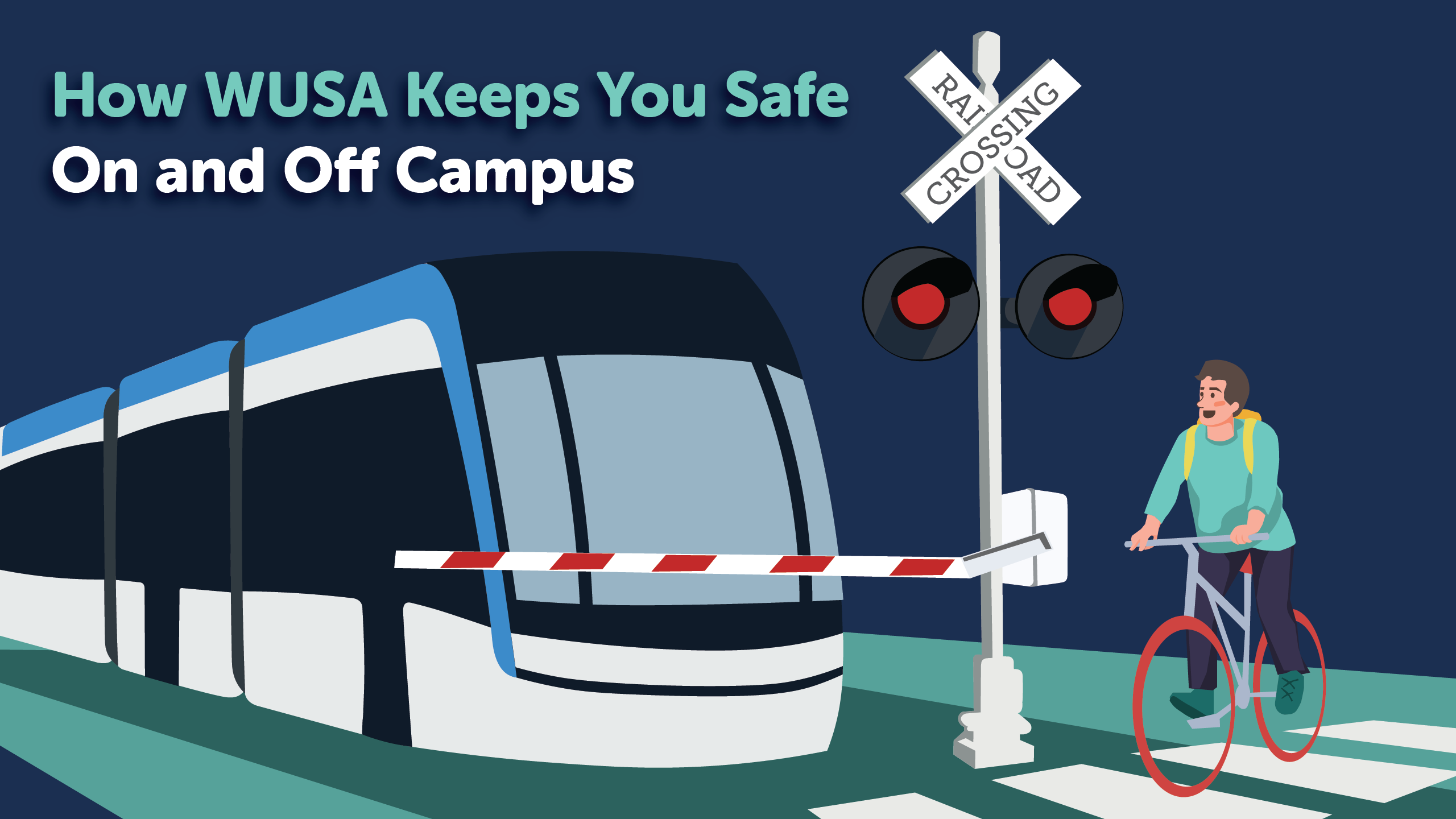How WUSA Keeps You Safe On and Off Campus

Student safety is a priority at WUSA. Every student deserves to feel safe, supported, and seen. Yet, for many at the University, safety is more than just the absence of harm. It’s the presence of belonging, understanding, and trust. Through research, advocacy, and campus initiatives, WUSA is deepening its commitment to student safety by creating a community where care and connection come first.
Research-Backed Advocacy
In a survey WUSA sent out in fall 2023, 71% of respondents indicated that they feel safe on campus. However, at night, this number drops to only 40%. Within that, gender non-conforming students, international students, and students with disabilities consistently reported lower feelings of safety and trust amongst the student population. 44% of students report bus stops are the most concerning areas, with walking paths at a close second at 43%. Moreover, the biggest triggers are walking alone at night (66% of respondents) and being around strangers at night (63% of respondents).
WUSA is developing a formal position statement on student safety, which will soon guide future advocacy and programming. We are committed to improving personal, emotional, and psychological safety for all students. More details can be found here.
On-Campus Safety
There are several on-going initiatives to support safety on campus. We hosted a Safety Roundtable earlier this year, addressing student awareness of a future WalkSafe program and perception of its feasibility. We also consulted with 200+ undergraduates as we prepare for the WalkSafe pilot. The WalkSafe program is one that would assist students walking around campus at night. WUSA will be piloting the WalkSafe program on main campus in winter 2026 to test interest and feasability.. We’ve also shared research findings with campus partners to inform future collaborative efforts. More details can be found here.
Various resources are available to students as well.
- WUSA Services – Includes RAISE, Women’s Centre, Mates, and more.
- RAISE works with the University to acknowledge and address the impacts of racism and xenophobia, using anti-oppression approach to dismantle systemic barriers.
- The Women’s Centre aims to provide a female-positive and supportive environment on campus for all women and trans* folks.
- Mates Peer Support assists students experiencing social and academic challenges as well as low-level mental health concerns and stress.
- Accessibility Services – The University’s centralized office for academic accommodations for students with disabilities, including chronic, temporary, episodic, and more.
- Campus Counselling – The University provides counselling services, including same-day appointments, for one-on-one counseling, group therapy, and skills seminars.
- Empower Me – A confidential mental health and wellness service available to you 24/7 through phone, video call, or in person.
- Health Services – The on-campus student medical clinic, providing primary care and all medical services.
- Special Constables – The University’s 24/7 patrols can be reached by phone at 519-888-4911.
- Campus Response Team (CRT) – CRT is a student-run service that provides support to main campus. They are equipped to provide care in medical emergencies, trauma injuries, and mental health crises. They can be reached at 226-339-0462, Monday through Friday from 4pm to 10pm.
Off-Campus Safety
Many students commute to the University of Waterloo using the GRT busses and the ION. Students can stay safe by requesting alternative stops along any bus route that is closer to your destination after dusk or 9 p.m. They can also board the bus during emergencies, also known as the Safe Haven program. If you feel you are in danger or fear for your safety, you can get on a bus at day or night. Additionally, for your security, all GRT buses have security cameras, emergency escape windows, manual door openers, fire extinguishers, and ceiling escape hatches. More information on how to ride GRT safely can be found here.
For everyone commuting to campus – whether you drive, take transit, or walk – stay alert about the vehicles and environment around you and keep an eye out for inclement conditions. Some tips for commuting students include:
- Make eye contact with drivers and cyclists before you move
- Don’t cross the ION tracks when the barriers are down
- Look both ways before crossing the street – even on one-way streets!
- Letting a trusted friend know your route
- Carrying a phone charger or back up battery pack
More commuting safety tips can be found here.
Moving Forward Together
WUSA’s ongoing work towards safety shows our continuous commitment to improving student safety both on and off campus. Through continued research, advocacy, and collaboration, WUSA is building a foundation for a safer and more inclusive student community.
Ella Wang
Communications Assistant
Published: Wednesday, November 12, 2025
